How to Make Herb Salt with Fresh Herbs
How to make herb salt in 4 simple steps! Use up those extra herbs or head to the grocery store, your mom’s garden or wherever you get your fresh herbs and try this fun DIY project!
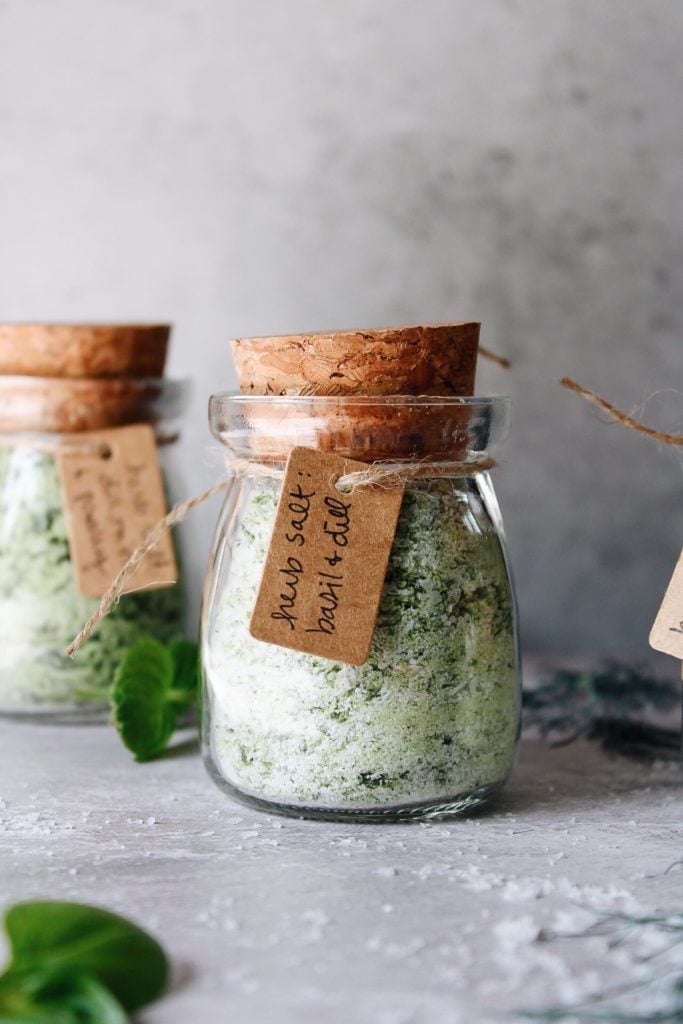
If you are looking for the perfect gift to give for holidays, or a DIY project that is so much fun, then learning how to make herb salt is a great idea! It’s a great way to preserve lots of herbs at once and in turn provide you with a new seasoning to add to your pantry. Homemade flavored salts can add delicious flavor to many dishes in place of regular salt! All you need to make herb salt is salt and fresh herbs. In this post, I will take you through the process (it’s really very simple) and we will talk about the kind of salt you should use. Let’s do this!
Disclaimer: This post may contain affiliate links, which means if you decide to purchase any of the items linked in this post, I should earn a small commission. This creates no additional cost to you and helps support the work that goes into running The Fig Jar. Thank you! -Becky
WHAT YOU’LL NEED TO MAKE HOMEMADE HERB SALT
- Kosher salt or sea salt
- Fresh herbs of choice
I used kosher salt to make my herb-infused salt because I was making large batches with plans to give it as a gift and I have a lot of it. My AeroGarden has a TON of fresh herbs (more than I can use and give away) so herb salt was the perfect way to use up the excess. You can use sea salt or a combination of the two.
WHAT KIND OF HERBS SHOULD I USE?
You can use any fresh herb to give your homemade herb salt recipe a unique flavor. The sky’s the limit!
- Dill
- Rosemary
- Parsley
- Basil
- Oregano
- Sage
- Cilantro
- Marjoram
- Chervil
- Savory
- Chives
You can also try making different herb blends. Have fun with it!
WHAT KIND OF SALT IS BEST FOR MAKING HERB SALT?
I used Diamond Crystal Kosher Salt (affiliate link) to make most of my herb salts. This is what I use daily for cooking and baking. Aside from using sea salt on my chocolate chip cookies of course.
You can also use coarse sea salt or a blend of the two if you want coarser salt in the end. Finishing salt (also called flake salt) is also good to use but can be a little bit pricey. Just do not use iodized table salt. Any type of salt (except one that is already seasoned) will work for this recipe.
HOW TO MAKE HERB SALT
STEP 1: SELECT HERBS
Gather your herbs, wash and dry them thoroughly.
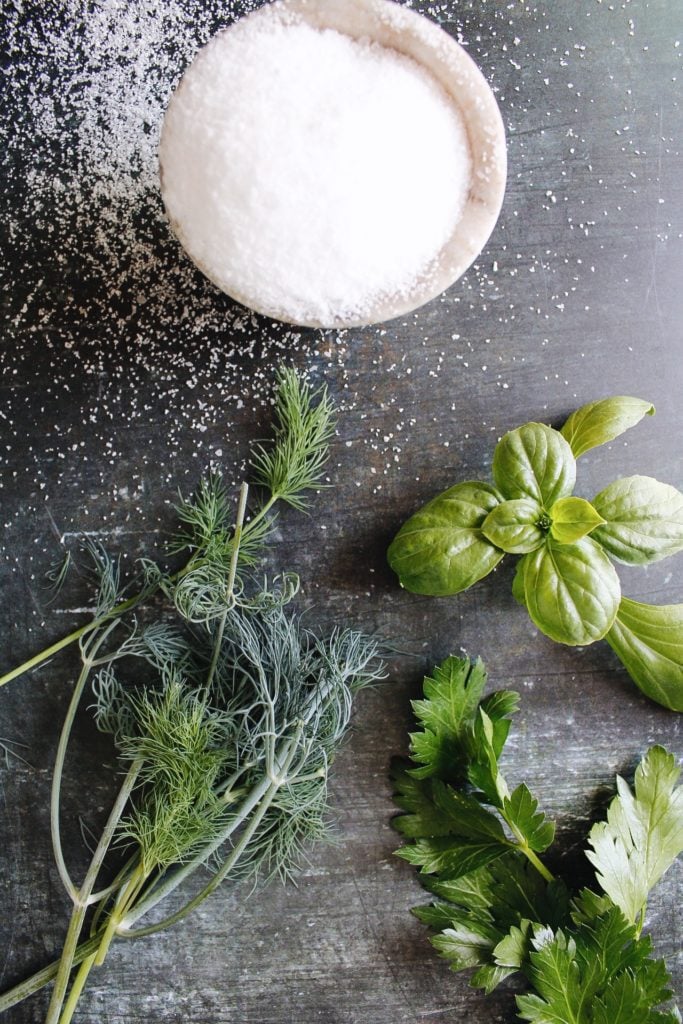
STEP 2: BLEND HERBS AND SALT
The ratio I use to make herb salt is 2 parts herbs and 1.5 parts salt. For example, 2 cups of fresh herbs and 1.5 cups salt. You can place all of the salt and herbs in the blender (or food processor) at once, but I like to reserve a half cup of salt to mix in after blending. Otherwise, the salt is very green and just looks kind of like kinetic sand.
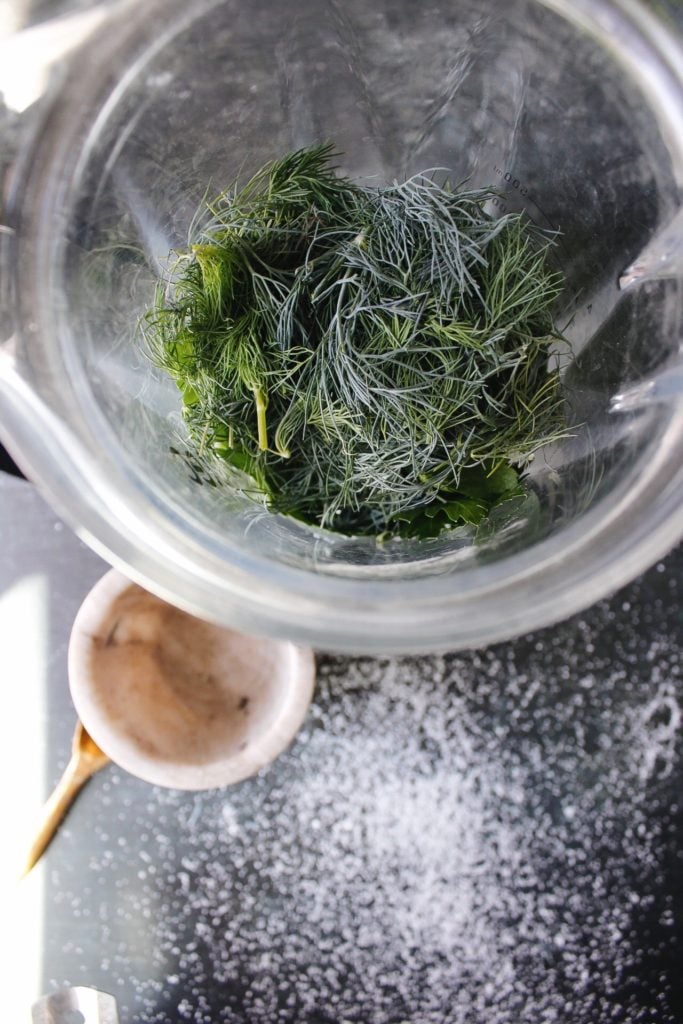
STEP 3: DRY THE MIXTURE
After blending, place a sheet of parchment paper onto a baking sheet. Pour the salt/herb mixture out onto the parchment paper in a thin layer. If you are making multiple blends, it’s helpful to write the herbs used on the parchment paper. Allow this to dry overnight. Leave it out on a counter or table where it won’t be disturbed by pets!
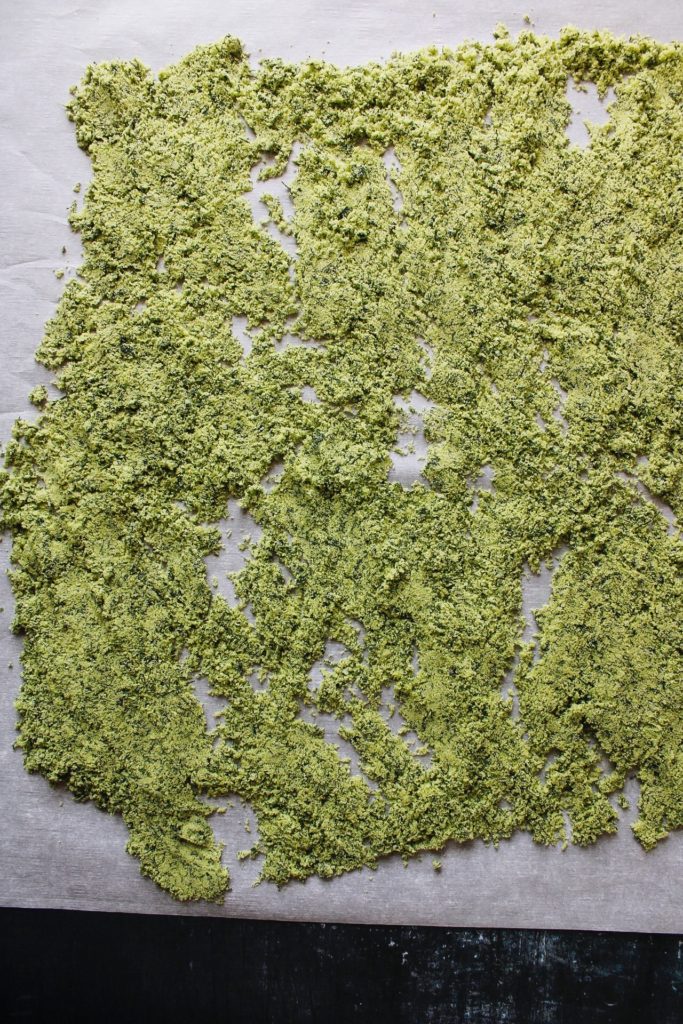
STEP 4: BOTTLE IT UP
Once the mixture is completely dry, break up the larger pieces of dried herbs, mix in the reserved salt and place in an airtight container or clean glass jar. Store for up to 1 year in your pantry. Herb salt’s long shelf life is another reason why these little jars of salt make great gifts!
A LITTLE NOTE ABOUT ROSEMARY SALT
So I love rosemary and I love rosemary salt but I use a higher ratio of salt to herbs with rosemary. Rosemary is so powerful and I just like to tone down the rosemary a touch. I would do 1 part rosemary, 2 parts salt.
Here is a link to the bottles pictured in this post: glass jars with cork lid (affiliate link). They come with twine and little tags, making it super convenient to make these quickly and efficiently. However, I do want to mention: you really have to push the corks down forcefully in order to secure them, and even then I would still be careful. If you are concerned about that, you might want to try small canning jars instead. I would buy these cork jars again even with the lack of a perfectly secure lid because they are just so darn cute and I really liked having the tags cut/hole-punched and twine ready to go.
Where to use herb salt
You can pretty much use herb salt wherever you use regular salt (except things like cookies of course!). Some ideas include:
- Marinades for meat and fish
- On top of eggs
- Sprinkled in olive oil for dipping bread
- On avocado toast
- In pickled onions
- On roasted veggies like carrots and butternut squash
You get the idea! You can use it almost anywhere!
Tried making your own herb salt?
If you’ve tried making your own herb salt I’d love to hear about it! Leave a comment/rating below and find me on instagram @thefigjar!
PrintHerb Salt
Preserve excess fresh herbs by making herb salt! A great way to preserve excess herbs and add a special touch to all sorts of dishes. This also makes a fun homemade gift!
- Category: Condiment
Ingredients
- 2 cups fresh herbs (*see notes)
- 1 1/2 cups kosher salt or sea salt
Instructions
- Wash and dry herbs thoroughly.
- Pulse herbs and 1 cup of salt in a blender until well blended. Stir in remaining 1/2 cup of salt.
- Spread mixture on parchment paper and let it dry out overnight.
- Break up clumps of salt with a spoon and place in a clean jar or air tight container for up to one year.
Notes
Rosemary – if you want to make rosemary salt, use 1 cup rosemary, 2 cups salt

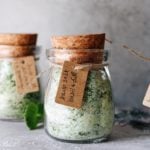




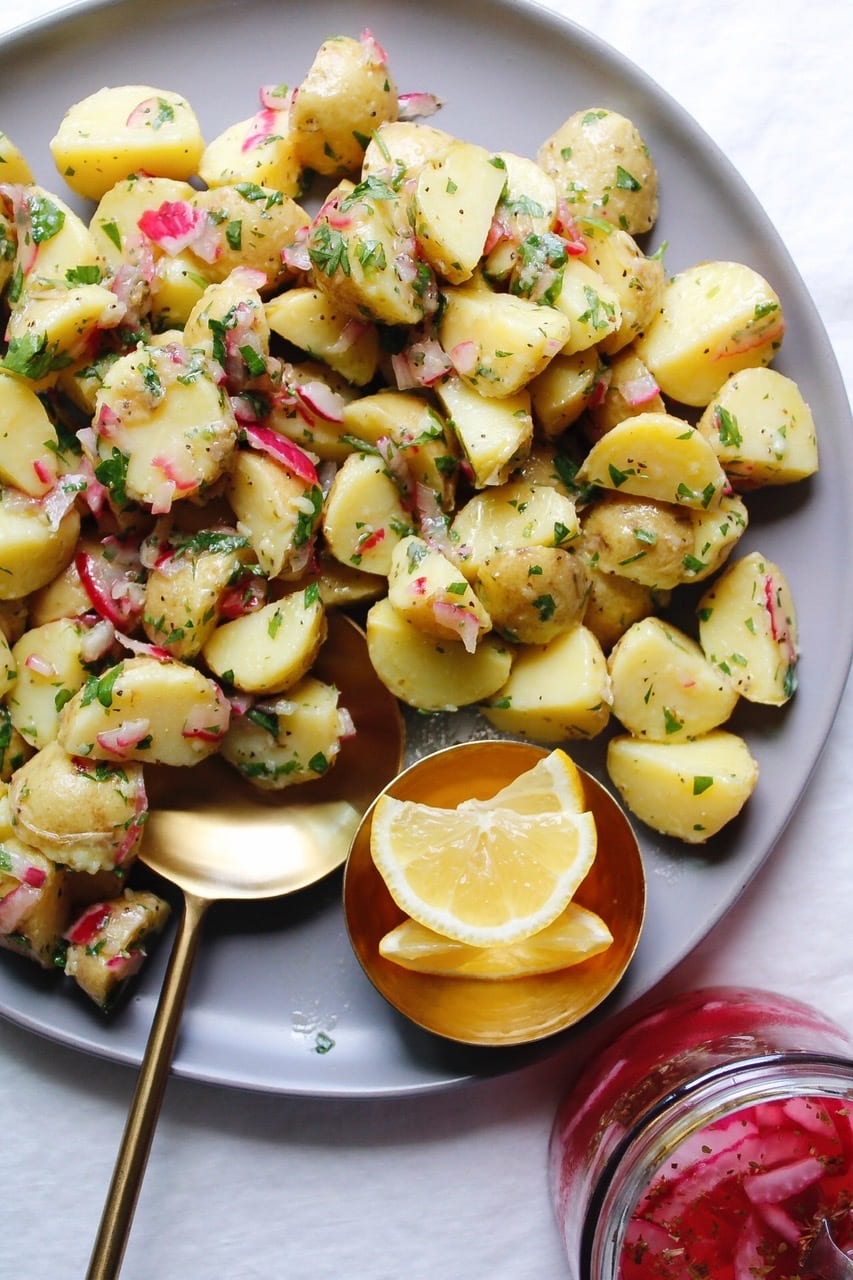
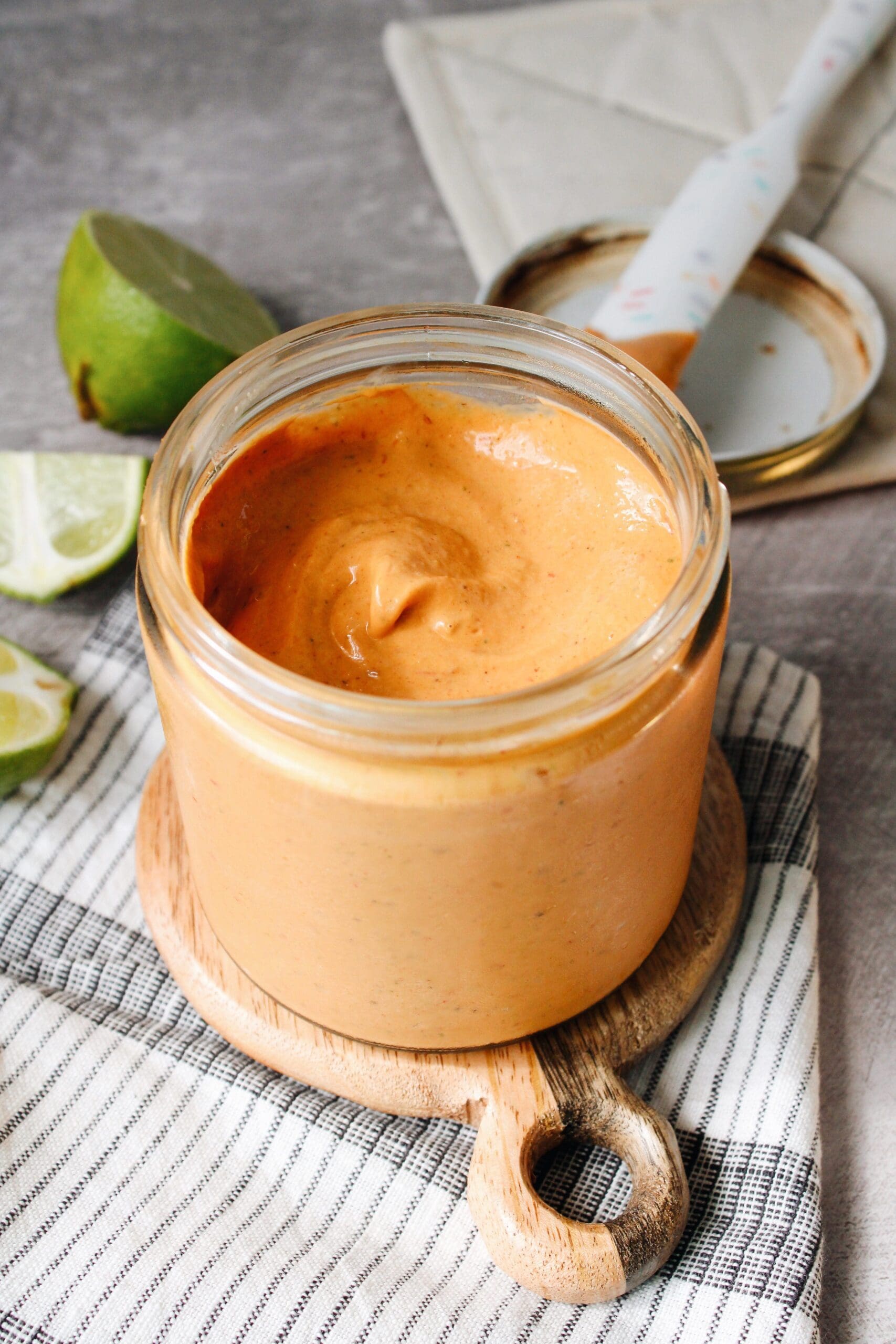
Made these and they are sooooo cute! Can’t wait to give them out as gifts! I actually didn’t have a hard time with the tops and it seems to be pretty secure on my jars bought with the link 🙂 thank you for sharing!
Oh good! I had trouble with a few but maybe I’m just weak hehe
Does it make a difference whether you dry the herbs in the oven beforehand and then mix with salt, or mix with salt first and then dry it all together?
Hi Katie, I think it would be fine to dry the herbs out first.